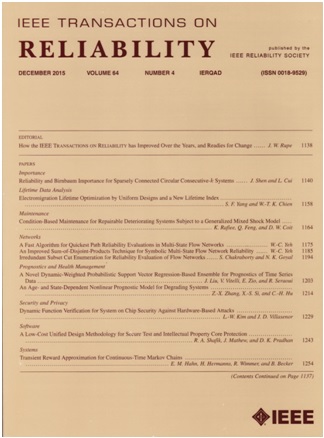Modeling and Verification of MRSCAN Based on MapReduce Framework
IF 5.7
2区 计算机科学
Q1 COMPUTER SCIENCE, HARDWARE & ARCHITECTURE
引用次数: 0
Abstract
Network clustering (graph clustering) plays a crucial role in discovering the inherent structures within networks. MapReduce-based structural clustering algorithm for networks (MRSCANs) designed based on MapReduce's parallel computing model, efficiently handles large-scale data. However, MRSCAN can only be tested through experiments, and its correctness cannot be guaranteed. To address this issue, this article has achieved the first implementation of functional MRSCAN modeling and subjected it to rigorous mechanized verification in Isabelle. First, based on Google's MapReduce model type definition and higher-order generic functions, a general MapReduce-based algorithm functional modeling framework is constructed across the fundamental global phases of Map, Shuffle, and Reduce. Moreover, diverse strategies are devised during the Shuffle phases according to user requirements, enhancing the applicability and generality of the MapReduce functional modeling framework. Second, formalizing the definition of MRSCAN, is delineated into four key steps: similarity calculation, core calculation, dimension expansion, and structural clustering. Furthermore, the MapReduce functional modeling framework is applied to these four steps to achieve the functional modeling of MRSCAN, which improves efficiency compared to other structural clustering algorithm for networks (SCANs) algorithms. Lastly, a verification framework for MapReduce-based algorithms is proposed at both the global and shuffle stages. Based on this framework, the correctness and reliability of MRSCAN are ensured. The model framework and verification framework of MapReduce-based algorithms proposed in this article can not only address functional modeling and verification of MRSCAN but also provide a reference for a series of other MapReduce-based functional program designs and proofs.基于MapReduce框架的MRSCAN建模与验证
网络聚类(图聚类)在发现网络内部固有结构方面起着至关重要的作用。基于MapReduce并行计算模型设计的基于MapReduce的网络结构聚类算法(MRSCANs),可以有效地处理大规模数据。然而,MRSCAN只能通过实验进行测试,其正确性无法保证。为了解决这个问题,本文实现了功能性MRSCAN建模的第一个实现,并在Isabelle进行了严格的机械化验证。首先,基于谷歌的MapReduce模型类型定义和高阶泛型函数,在Map、Shuffle和Reduce的基本全局阶段构建了一个通用的基于MapReduce的算法功能建模框架。此外,在Shuffle阶段根据用户需求设计了多种策略,增强了MapReduce功能建模框架的适用性和通用性。其次,将MRSCAN的定义形式化,分为四个关键步骤:相似性计算、核心计算、维度扩展和结构聚类。此外,将MapReduce功能建模框架应用于这四个步骤,实现MRSCAN的功能建模,与其他网络结构聚类算法(SCANs)算法相比,提高了效率。最后,提出了基于mapreduce算法在全局和shuffle阶段的验证框架。基于该框架,保证了MRSCAN的正确性和可靠性。本文提出的基于mapreduce的算法模型框架和验证框架不仅可以解决MRSCAN的功能建模和验证问题,还可以为其他一系列基于mapreduce的功能程序设计和证明提供参考。
本文章由计算机程序翻译,如有差异,请以英文原文为准。
求助全文
约1分钟内获得全文
求助全文
来源期刊

IEEE Transactions on Reliability
工程技术-工程:电子与电气
CiteScore
12.20
自引率
8.50%
发文量
153
审稿时长
7.5 months
期刊介绍:
IEEE Transactions on Reliability is a refereed journal for the reliability and allied disciplines including, but not limited to, maintainability, physics of failure, life testing, prognostics, design and manufacture for reliability, reliability for systems of systems, network availability, mission success, warranty, safety, and various measures of effectiveness. Topics eligible for publication range from hardware to software, from materials to systems, from consumer and industrial devices to manufacturing plants, from individual items to networks, from techniques for making things better to ways of predicting and measuring behavior in the field. As an engineering subject that supports new and existing technologies, we constantly expand into new areas of the assurance sciences.
 求助内容:
求助内容: 应助结果提醒方式:
应助结果提醒方式:


